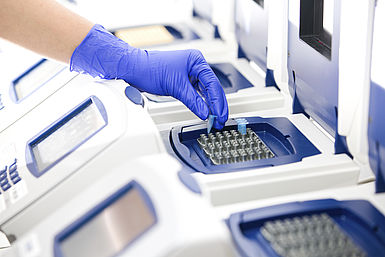Please type a search term (at least two characters)
News
EMPIR project on biological research helps support COVID-19 response

A recently completed EMPIR project has helped develop 3 standards about the counting of biological entities important for diagnosing respiratory infections
The accurate detection and measurement of biological molecules such as cells and nucleic acids underpins many different fields, from biotechnology, food production and the environment to large areas of modern medicine. In the medical sector this includes clinical diagnostics for monitoring circulating tumor cells during cancer progression or remission and the bacterial or viral load in patients. The latter is of particular importance as respiratory tract infections such as pneumonia, influenza and tuberculosis alone account for almost 50 % of all deaths from infectious diseases. With the current worldwide COVID-19 crisis, these measurements are more important than ever.
These types of biological measurements can be challenging to make accurately and reproducibly as infectious agents can be present at very low levels in the body and this, coupled with a lack of validated protocols with traceability to the SI, can lead to inconstancies in measurement methods. This can result in over-diagnosis, resulting in costly and inappropriate treatment, or under-diagnosis with possible adverse consequences for patients.
A recently completed EMPIR Support for Impact project New underpinning standards for improved bio-analytical measurement in Biotechnology & In vitro Diagnostics (16SIP01, Bio-stand) led by the National Measurement Laboratory at LGC, the UK’s designated measurement institute for biological and chemical metrology, sought to address these measurement issues.
Working closely with International Organization for Standardization (ISO) committees for biotechnology (ISO TC 276) and clinical laboratory testing and in vitro diagnostic test systems (ISO TC 212) the project has helped translate the knowledge gained in results of two previous EMRP projects into new ISO standards.
- The EMRP project Traceability for biologically relevant molecules and entities (SIB54, Bio-SITrace) developed new cell counting methods along with protocols for the metrologically sound characterisation of pure biological materials for use as calibration materials.
- The EMRP project Metrology for monitoring infectious diseases, antimicrobial resistance, and harmful micro-organisms (HLT08, INFECT-MET ) successfully developed highly accurate SI traceable methods to support the quantification of bacteria in clinical samples and generated reference materials for use in External Quality Assessment (EQA) schemes.
The key outputs of the Bio-SITrace project, including proof of concept papers and traceability chains for accurate and traceable quantification of nucleic acids and cells, have now been incorporated into recently published documentary standards: ISO 20395 and ISO 20391 (Part 1 & 2). The work of INFECT-MET is helping to develop the ISO 17822-2 standard addressing in vitro examination procedures for the detection and identification of microbial pathogens.
Although only recently finished the Bio-stand project will have a lasting, positive impact in the medical and biotechnology fields.
This impact is already being seen, with ISO 20395:2019 included in a list of standards related to respirators and essential medical devices compiled in order to support global efforts to deal with the COVID-19 situation. This standard, amongst others, has already been central in the implementation of the quality assurance for UK field labs testing for Coronavirus, and has the potential for use across Europe.
The standards developed through this project will allow healthcare providers, in vitro diagnostic users and manufacturers, and research and development laboratories deliver accurate detection and identification of microbial pathogens in human specimens, helping to mitigate against the use of inaccurate and unreliable tests.
EMPIR projects are co-funded by the European Union's Horizon 2020 research and innovation programme and the EMPIR Participating States.
EMRP joint research projects are part of EURAMET’s European Metrology Research Programme. The EMRP is jointly funded by the EMRP participating countries within EURAMET and the European Union.
Want to hear more about EURAMET?
Sign up for EURAMET newsletters and other information
Follow us on LinkedIn and Twitter
Carbon dioxide, released from man-made activities, is lowering the pH of the Earth’s oceans, and impacting the health of marine organisms worldwide more
Supporting automated and reconfigurable manufacturing systems more
Working with external project Cool White to test and suggest improvements on the locally available white paints more
The project FutureEnergy has provided new calibration services for ultra-high voltages and a good practice guide on Lightning Impulse dividers more
For many of the 5000 photonics companies in Europe a precise knowledge of a material’s optical properties is vital for industrial competitiveness more





